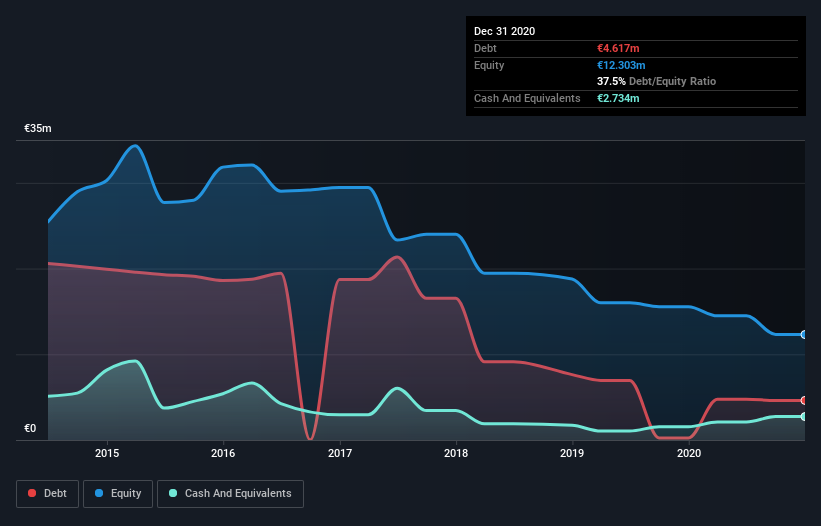
Howard Marks put it nicely when he said that, rather than worrying about share price volatility, 'The possibility of permanent loss is the risk I worry about... and every practical investor I know worries about.' It's only natural to consider a company's balance sheet when you examine how risky it is, since debt is often involved when a business collapses. We note that Turbon AG (FRA:TUR) does have debt on its balance sheet. But should shareholders be worried about its use of debt?
When Is Debt A Problem?
Debt is a tool to help businesses grow, but if a business is incapable of paying off its lenders, then it exists at their mercy. Part and parcel of capitalism is the process of 'creative destruction' where failed businesses are mercilessly liquidated by their bankers. However, a more frequent (but still costly) occurrence is where a company must issue shares at bargain-basement prices, permanently diluting shareholders, just to shore up its balance sheet. Of course, plenty of companies use debt to fund growth, without any negative consequences. The first thing to do when considering how much debt a business uses is to look at its cash and debt together.
Check out our latest analysis for Turbon
What Is Turbon's Net Debt?
The image below, which you can click on for greater detail, shows that at December 2020 Turbon had debt of €2.77m, up from €244.0k in one year. However, it also had €2.73m in cash, and so its net debt is €39.0k.

How Healthy Is Turbon's Balance Sheet?
According to the last reported balance sheet, Turbon had liabilities of €11.5m due within 12 months, and liabilities of €15.2m due beyond 12 months. Offsetting these obligations, it had cash of €2.73m as well as receivables valued at €4.50m due within 12 months. So its liabilities outweigh the sum of its cash and (near-term) receivables by €19.5m.
This deficit casts a shadow over the €12.8m company, like a colossus towering over mere mortals. So we'd watch its balance sheet closely, without a doubt. At the end of the day, Turbon would probably need a major re-capitalization if its creditors were to demand repayment. Turbon may have virtually no net debt, but it does have a lot of liabilities. The balance sheet is clearly the area to focus on when you are analysing debt. But it is Turbon's earnings that will influence how the balance sheet holds up in the future. So if you're keen to discover more about its earnings, it might be worth checking out this graph of its long term earnings trend.
In the last year Turbon had a loss before interest and tax, and actually shrunk its revenue by 24%, to €42m. To be frank that doesn't bode well.
Caveat Emptor
While Turbon's falling revenue is about as heartwarming as a wet blanket, arguably its earnings before interest and tax (EBIT) loss is even less appealing. To be specific the EBIT loss came in at €447k. When we look at that alongside the significant liabilities, we're not particularly confident about the company. We'd want to see some strong near-term improvements before getting too interested in the stock. It's fair to say the loss of €2.0m didn't encourage us either; we'd like to see a profit. And until that time we think this is a risky stock. There's no doubt that we learn most about debt from the balance sheet. However, not all investment risk resides within the balance sheet - far from it. For example Turbon has 2 warning signs (and 1 which is significant) we think you should know about.
At the end of the day, it's often better to focus on companies that are free from net debt. You can access our special list of such companies (all with a track record of profit growth). It's free.
If you’re looking to trade a wide range of investments, open an account with the lowest-cost* platform trusted by professionals, Interactive Brokers. Their clients from over 200 countries and territories trade stocks, options, futures, forex, bonds and funds worldwide from a single integrated account. Promoted
Valuation is complex, but we're here to simplify it.
Discover if Turbon might be undervalued or overvalued with our detailed analysis, featuring fair value estimates, potential risks, dividends, insider trades, and its financial condition.
Access Free AnalysisThis article by Simply Wall St is general in nature. It does not constitute a recommendation to buy or sell any stock, and does not take account of your objectives, or your financial situation. We aim to bring you long-term focused analysis driven by fundamental data. Note that our analysis may not factor in the latest price-sensitive company announcements or qualitative material. Simply Wall St has no position in any stocks mentioned.
*Interactive Brokers Rated Lowest Cost Broker by StockBrokers.com Annual Online Review 2020
Have feedback on this article? Concerned about the content? Get in touch with us directly. Alternatively, email editorial-team (at) simplywallst.com.
About DB:TUR
Turbon
Engages in the development, production, and sale of typeface printing accessories in Europe, the United States, and Asia.
Excellent balance sheet second-rate dividend payer.
Market Insights
Community Narratives



